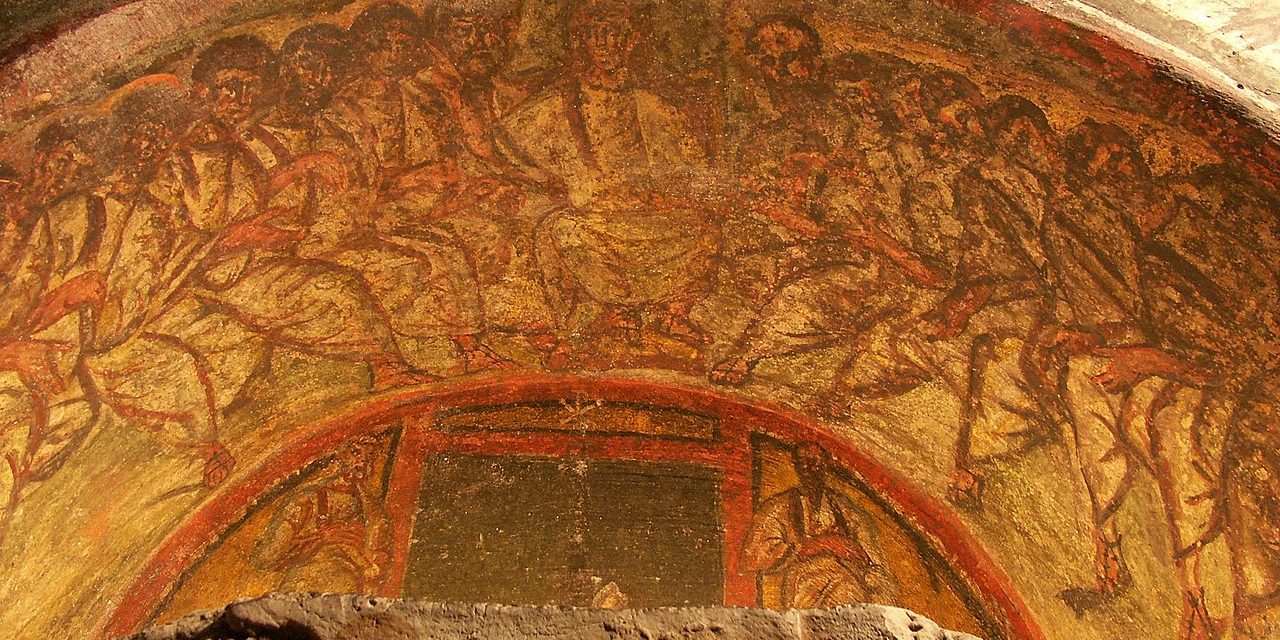2e dimanche après la Pentecôte le 11 juin 2023
L’un des dictons les plus célèbres de Benjamin Franklyn est « Rien n’est certain à part la mort et les impôts ». Dans de nombreuses cultures à travers le monde, les deux étaient également redoutés : en particulier pour ceux qui vivaient sous des régimes despotiques où les collecteurs d’impôts étaient sans scrupules. Ce n’est pas un choix de carrière très attirant. On imagine mal un enfant rêver de devenir collecteur d’impôts quand il sera grand! Dans la Palestine du temps de Jésus, les gens qui devenaient collecteurs d’impôts le faisaient parce qu’ils voulaient gagner rapidement beaucoup d’argent. Malheureusement, cette richesse avait un prix très élevé. Les collecteurs d’impôts étaient parmi les membres les plus détestés de la société. Ils étaient accusés de collaborer avec les forces d’occupation romaines ; ils étaient accusés de gagner de l’argent sur le dos des opprimés et de ceux qui souffraient. Si Jésus avait voulu recruter des disciples parmi les professions les plus susceptibles de produire des personnes dévouées, aimantes et compatissantes, il n’aurait pas perdu son temps à en chercher parmi les collecteurs d’impôts. Mais Jésus ne jugeait pas les gens en fonction de leur travail ou de leurs vêtements. Il n’était certainement pas en train de faire du « profilage ». Dans ce même chapitre de l’Évangile de Matthieu, nous apprenons qu’il a mangé avec des publicains et des gens de mauvaise réputation. Les autorités religieuses de l’époque de Jésus ont trouvé cela tellement choquant qu’elles ont publiquement critiqué Jésus pour ses fréquentations.
Souvent, ces collecteurs d’impôts installaient leurs échoppes sur les grandes routes, où ils étaient assurés de rencontrer des commerçants ou des voyageurs à qui ils pouvaient extorquer de lourdes sommes. Jésus rencontre le collecteur d’impôts Matthieu alors qu’il est en route du pays des Gadaréniens vers la Galilée, et nous pouvons supposer que c’est sur cette route que Matthieu avait installé sa table de collecte. Nous ne savons pas grand-chose d’autre sur Matthieu. Certains pensent qu’il s’agit du même Matthieu que celui qui a écrit l’Évangile du même nom. D’autres pensent que l’Évangile porte son nom en signe de respect, mais qu’il ne l’a pas écrit. Ce petit récit de son appel ne nous donne pas beaucoup d’indications sur son caractère. On nous dit qu’il est collecteur d’impôts et qu’il a simplement quitté son métier et sa famille (s’il en avait une) lorsque Jésus lui a dit : « Suis-moi ». Ce commandement a dû être impérieux pour Matthieu, qui a simplement abandonné sa table et la perspective de continuer à amasser plus d’argent en échange d’une vie sur la route.
Nous pouvons également voir l’urgence et l’immédiateté de cet impératif de suivre Dieu dans l’appel d’Abraham. Il n’y a pas de préambule. Il n’y a que la voix de Dieu, qui dit : « Quitte ton pays et va où je te dirai ». Il y a une limite à la préparation que nous pouvons avoir pour répondre à un appel comme celui-ci, qui semble venir de nulle part. De par sa nature même, il perturbe nos plans minutieux. Abraham a suivi l’appel de Dieu et a fini par parcourir près de mille kilomètres jusqu’en Égypte, puis de nouveau jusqu’en Palestine. Il y a une véritable ironie dans son histoire. Dieu lui avait promis un pays entier et une descendance aussi nombreuse que les grains de sable au bord de la mer. Pourtant, il n’a jamais vécu dans une maison avec quatre murs et un toit. Il était constamment en train de planter sa tente dans un nouvel endroit. Sa maison était l’appel de Dieu et les promesses que Dieu lui avait faites. Une fois qu’il avait trouvé sa maison en Dieu, il avait confiance que tout le reste suivrait automatiquement.
Les disciples ont dû ressentir la même chose en suivant Jésus. Chacun d’entre eux avait quitté ce qui lui était le plus cher : sa famille, sa maison, son gagne-pain. À partir de ce moment, le seul endroit qu’ils pouvaient appeler « maison » était l’endroit où Jésus avait choisi de poser sa tête. Certains d’entre nous ont la chance d’avoir accès à une maison ou un appartement où ils se sentent parfaitement chez eux. D’autres travaillent dur pour trouver un endroit qu’ils pourront appeler le leur. D’autres encore n’ont peut-être pas beaucoup d’espoir de trouver un tel foyer ; il se peut même que vous vous sentiez exilés et seuls dans un endroit où rien ne semble avoir de sens.
Quelle que soit la situation dans laquelle nous nous trouvons, les récits de l’appel d’Abraham et de l’appel de Matthieu peuvent nous réconforter. Dieu n’a pas appelé Abraham parce qu’il était un homme bien meilleur que ses voisins. Jésus n’a pas appelé Matthieu parce qu’il était un collecteur d’impôts beaucoup plus saint et juste que les autres. Chacun d’entre nous peut entendre ce même appel – peu importe qui nous sommes ou ce que nous avons fait. Chacun de nous est un enfant d’Abraham. Parfois, nous pensons que nous pouvons voir notre ultime destination. À d’autres moments, nous avons à peine assez de foi pour mettre un pied devant l’autre. Dans ces moments-là, il est important de se rappeler que notre sécurité et notre paix reposent sur Dieu seul. En attendant la fin de notre exil dans notre foyer céleste, nous trouvons notre foyer et notre réconfort dans les communautés d’amour et de soutien que nous découvrons ici, dans des lieux comme Saint-Esprit. Je ne serai pas parmi vous dimanche prochain, mais je penserai à vous tous à Paris. Je suis sûre que j’y rencontrerai d’autres personnes qui ont entrepris des voyages similaires aux nôtres et qui ont trouvé un lieu de sécurité comme St. Esprit.
NJM Ver. Fr. FS
Pentecost 2
June 8, 2008
Genesis 12:1-9 Romans 4:1-13 Matthew 9:1-28
One of Benjamin Franklyn’s most famous sayings is “Nothing is certain apart from death and taxes”. In many cultures throughout the world, both were equally dreaded: especially for those who lived under despotic regimes where the tax collectors were unscrupulous. It is hardly an enticing career choice. It is hard to imagine a child dreaming of becoming a tax collector when they grow up! In the Palestine of Jesus’ day, people who became tax collectors did so because they wanted to make a lot of money in a short time. Unfortunately, their resulting wealth came at a very heavy price. Tax collectors were among the most detested members of society. They were accused of collaborating with the occupying Roman forces; they were accused of making their money on the backs of the oppressed and the suffering. Had Jesus been in the business of recruiting disciples from the professions most likely to produce dedicated, loving and compassionate people, he would not have wasted his time looking among the tax collectors. But Jesus did not judge people by the jobs they had or the clothes they wore. He was most certainly not in the business of “profiling”. We hear in this same chapter of the Gospel of Matthew that he ate with publicans and people with bad reputations. The religious authorities of Jesus’ day found it so shocking that they publicly criticized Jesus for the company he kept.
Often, these tax collectors set up their stalls on major roads, where they were assured of meeting traders or travelers from whom they could extort heavy payments. Jesus meets the tax collector Matthew while he is on his way from the country of the Gadarenes to Galilee, and we can assume that it was on this road that Matthew had set up his collecting table. We don’t know much else about Matthew. Some people think that he is the Matthew who wrote the Gospel with the same name. Others believe that the Gospel was named after him as a mark of respect, but not written by him. We don’t get much of an idea of his character from this little story about his call. We are told that he is a tax collector, and that he simply left his trade and his family (if he had one) when Jesus says to him, “Follow me”. It must have been a compelling command for Matthew to have simply abandoned his table and the prospect of making further lucrative gains in exchange for a life on the road.
We can also see the urgency and immediacy of this imperative to follow God in the call of Abraham. There is no preamble. Just the voice of God, who says “Leave your homeland, and go where I tell you.” There is a limit to how much we can prepare ourselves to respond to a call like this that seems to come out of the blue. By its very nature it disrupts our careful plans. Abraham followed God’s call, and ended up travelling almost one thousand miles down into Egypt and then back again into Palestine. There is a real irony in his story. God had promised him a whole country, and descendants as numerous as the grains of sand on the seashore. And yet he never lived in a house with four walls and a roof. He was constantly pitching his tent in a new place. His home was the call of God and the promises that God had made to him. Once he found his home in God, he trusted that all the rest would automatically follow.
The disciples must have felt the same way about following Jesus. Every single one of them had left what was most dear to them; their families, their homes, their means of making a living. From that moment on, the only place they could call ‘home’ was the place where Jesus chose to lay his head. Some of us are lucky enough to have houses or apartments where we feel that we are completely at home. Others of us are working hard to find a place that we can call our own. Others perhaps do not have much hope of securing such a home; you may even feel exiled and lonely in a place where nothing seems to make sense.
Whatever place we find ourselves in, the stories of the call of Abraham and of the call of Matthew can bring us comfort. God did not call Abraham because he was a much better man than his neighbors. Jesus did not call Matthew because Matthew was a much more holy and righteous tax collector than the others. Every one of us can hear that very same call – no matter who we are or what we have done. Every one of us is a child of Abraham. Sometimes we think that we can see our final destination. At other times we may have barely enough faith to put one foot in front of the other. At those times, it is important to remember that our security and our peace lie in God alone. In the meantime, while we look forward to the end of our exile in our heavenly home, we find our home and our comfort in the communities of love and support we discover here, in places like St. Esprit. I won’t be with you next Sunday, but I will be thinking of you all in Paris. I’m sure I will be meeting with others there who have set out on similar journeys to our own, and found a place of safety like St. Esprit.
NJM

